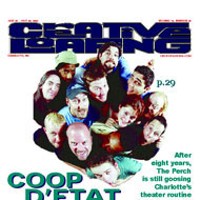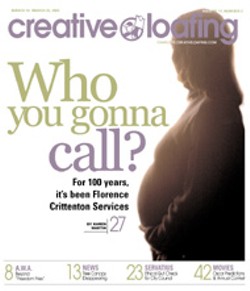-- from the "Rules and Regulations of the Florence Crittenton Industrial Home," January 25, 1936.
At mid-morning, the Florence Crittenton Services building, just down the street from Carolinas Medical Center, is quiet. The receptionist is at the front desk, discreetly buzzing the lock on the front door, admitting a delivery person. The women "clients" -- with few exceptions pregnant, and without exception, facing some of life's toughest challenges -- are out of sight. Some are in school classes, others are at doctors' appointments, others are in programs to build their literacy.It's all quite a change from the days in 1903 when the Charlotte chapter of Florence Crittenton Services was established after a 16-year-old unwed, pregnant girl committed suicide by swallowing crushed glass rather than bring the shame of her condition upon herself and her family.
Now in its 100th year, Florence Crittenton Services has helped approximately 35,000 pregnant girls and women who've needed a safe, welcoming place during their pregnancies. The home, along with society, has changed dramatically over the years. No longer is it an "industrial home," accepting only women who have never been married and are expecting their first child. No longer does it insist that women, after delivery, must take their babies with them.
These days, it has expanded its services to include adoption support programs, parenting programs and programs that develop life skills and social skills in order to break the cycle of adolescent pregnancy, child abuse, substance abuse and neglect.
"I needed somewhere peaceful to go," says former Florence Crittenton Services client 19-year-old La'Nae Grimes, who delivered her daughter Kennedy in November. She was having "problems" at home and, although she doesn't give details, she describes a household with two younger brothers, two younger sisters and "nieces and nephews all around." Her godmother, a preacher, recommended Florence Crittenton Services. When Grimes toured the quiet building, with its sunny patio, comfortable parlor and dorm-like rooms, she says she knew she needed to be here: "I wanted to sign up right away."
Other women turn to the agency because they have nowhere else to go. Some have been victims of physical and emotional abuse, or incest. Some come from families where substance abuse is common. Some arrive from foster care programs that aren't able to provide pregnancy services.
"Sometimes the youngsters have not really been close to their family anymore," says Marilyn Thompson, the agency's CEO, who has been involved with Florence Crittenton, originally as a social worker, for 23 years. ". . .these are some very real issues in our society that we have to deal with."
Even though general attitudes toward unwed mothers are much more tolerant today, an unraveling social support system has actually made things more difficult for many of these women. Thompson suggests that the "splintering" of modern-day America -- whereby younger generations leave the support of their established family communities -- contributes to the women's difficulties. "The support system is just not as strong as it used to be, to help families or young people with some of these issues," she says.
"The (clients') needs may be different than they were (years ago), but they're certainly no less intense," agrees Lou Watson, Florence Crittenton Services' Outreach Coordinator. Whether as an employee or a volunteer, she's been with the agency for 30 years. "In some ways, they may be more intense. Florence Crittenton has simply responded to the needs the clients show when they come through the door."
History of Care
In the 1880s, New York City pharmaceutical salesman (and millionaire) Charles Crittenton lost his four-year-old daughter, Florence, to scarlet fever. Afterward, he made it his mission in life to help "fallen" and "dissipated" girls and young women, opening the Florence Night Mission to aid prostitutes who promised to go forth and sin no more. Crittenton later traveled in his private railroad car, "Good News," to communities throughout the country with the hope of establishing a network of homes. Today, there are 31 Florence Crittenton agencies across the country, comprising a division of the Child Welfare League of America. While all have the same essential mission of assistance for pregnant women in trouble, each has local leadership and its own rules. Some chapters, for instance, assist only girls aged 12-18. Others offer international adoption assistance. Some offer programs for the babies' fathers as well as the mothers.
In Charlotte, church and community leaders gathered together in 1903 to organize a Florence Crittenton program, which for three years housed single girls as young as 16 in private homes. The first group facility opened in 1906 at 523 N. McDowell Street. The girls were not allowed to bring "snuff, liquors, or drugs of any kind" into the home, according to the Rules and Regulations, and "any girl coming to the Home must bring a certificate from her home physician stating that she is free from any contagious or infectious disease. No feeble-minded nor venereal cases are admitted."
Latest in Cover
More by Karen Doyle Martin
-

Coop D'etat
Jul 24, 2002 -

Cho Nuff
Apr 24, 2002 -

Where Are They Now?
Apr 3, 2002 - More »
Calendar
-

Wine & Paint @ Blackfinn Ameripub- Ballantyne
-

Face to Face Foundation Gala @ The Revelry North End
-
An Evening With Phil Rosenthal Of "Somebody Feed Phil" @ Knight Theater
-
Kountry Wayne: The King Of Hearts Tour @ Ovens Auditorium
-

Queen Charlotte Fair @ Route 29 Pavilion
-
Canuck in the Queen City 7
A Canadian transplant looks back at her first year as a Charlotte resident
-
Homer's night on the town 41
If you drank a shot with the Knights mascot on Sept. 20, you were basically harboring a fugitive
-
Delic Holdings Inc. Announces Meet DELIC, the Premiere Psychedelic and Wellness Edutainment Event and Expo for Newcomers and Veteran Psychonauts, Announces Initial Speaker Lineup 42












